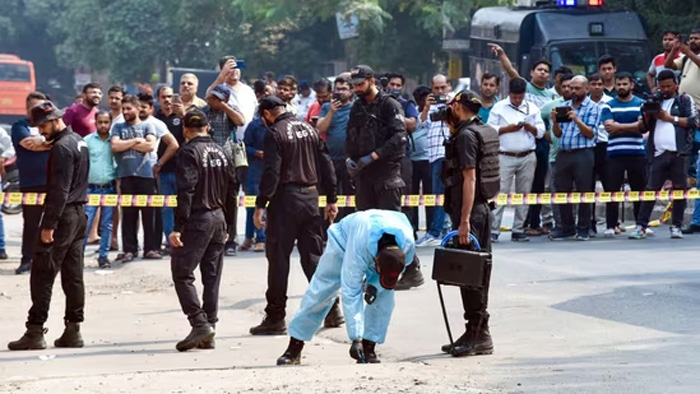‘Khalistan, Justice League India’: Delhi police probe viral message after blast
Delhi Police, probing the massive explosion near a CRPF school in Rohini, have reached out to social media app Telegram, seeking information about a handle named ‘Justice League India’, reports news agency PTI.
Hours after the blast, a screenshot of a Telegram post by Justice League India in which a clip of the blast with a “Khalistan Zindabad” watermark at the bottom was widely circulated on social media platforms.
“If Indian coward agency and their master think they can hire filthy goons to target our members to silence our voice then they live in fools world. They can’t imagine how close we are to them and how capable we are to strike anytime #KhalistanZindabad #JLI,” the Justice League India said in the post along with the clip.
Videos from the spot showed thick plumes rising from the blast site.
Police and witnesses report that the explosion, recorded on CCTV, damaged part of a school wall, shattered windowpanes of nearby shops, and affected several parked cars.
The blast was audible from several hundred meters away.
Authorities suspect the bomb was planted late at night, going off between 7:35 and 7:40 a.m., according to local residents.
This incident follows a wave of bomb threats directed at several airlines in recent days.
Residents describe ‘intense’ blast
Residents described the explosion as “intense” and reported a foul smell lingering in the area afterward.
Anita Singh, a local resident, had just returned from a temple when she heard the “very loud explosion.”
“I felt vibrations in my house, as if a cylinder had exploded nearby. Normally, I stand at the school gate in the morning waiting for my children’s bus,” she recounted.
“Thankfully, it was Sunday, so no one was hurt. I can’t help but think how disastrous it could have been if it had occurred on a weekday,” Singh added.
Teams from the FSL and NSG conducted inspections and collected samples, while police initiated a case under BNS sections for “mischief through explosion” and the Explosives Act.
NSG commandos deployed robots to search the area for additional explosive materials.
Samples of a “white powder” and soil from the site were sent to a lab for analysis to determine the bomb’s composition.
“A senior police officer indicated that the white powder might be a mixture of ammonium nitrate and chloride. The perpetrator seemingly chose the location to avoid harming anyone, intending instead to send a message.”

